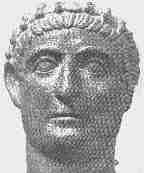 In 324 AD, after a long and bloody battle, Roman Emperor Constantine the Great defeated his final rival Licinius in the hills near Byzantium (ancient Istanbul). Being a noble-hearted conqueror, Constantine spared the treacherous Licinius's life. This victory had repercussions that were to affect the city's development enormously. First, Constantine adopted Christianity as the State religion of the Roman Empire. Second, he chose Byzantium as his new Christian capital. Although, there is scholarly debate on how "Christian" Constantine's rule actually was, as some scholars believe that he continued to pay heed to mythological divinities and pagan ceremonies. This was a major shift, as the former capital of the Roman Empire had been Rome, the center of Pagan worship.
In 324 AD, after a long and bloody battle, Roman Emperor Constantine the Great defeated his final rival Licinius in the hills near Byzantium (ancient Istanbul). Being a noble-hearted conqueror, Constantine spared the treacherous Licinius's life. This victory had repercussions that were to affect the city's development enormously. First, Constantine adopted Christianity as the State religion of the Roman Empire. Second, he chose Byzantium as his new Christian capital. Although, there is scholarly debate on how "Christian" Constantine's rule actually was, as some scholars believe that he continued to pay heed to mythological divinities and pagan ceremonies. This was a major shift, as the former capital of the Roman Empire had been Rome, the center of Pagan worship.
The city was officially dedicated as "New Rome" in 330 AD; it soon was unofficially christened Constantinople. The emperor shocked his courtiers by marking much greater boundaries than they expected around what had been the rather provincial Byzantine, so that soon it had quadrupled in size. Asked why he did so, he responded that he was following an invisible, presumably angelic guide.
With his typical energy, Constantine not only enlarged but also strengthened and beautified the city. For the next ten years, he looked toward the moral, political, and economic welfare of the citizens of his Empire and designated his sons as future rulers. When he was about to march against the Persian army in May of 337, he suddenly became ill and died, shortly after being baptized.
Constantine certainly earned the "Great" after his name. The history of the world was set on a new course when he made Christianity - which until that time had suffered bloody persecution - the state religion. This was hardly an imperative move since Christians were by far the minority at the time. Thus Constantine's decision depended less on general conditions at the time than on his own personal consideration. In 325 he assembled and attended the Council at Nicea where the Nicene Creed was formulated. It remains one of the basics of Christianity. Constantine was not only the first Christian Emperor, but he was the greatest of all Roman Emperors.
His great city and Empire lasted until 1453 when it was conquered by the Ottoman sultan Mehmet II.

